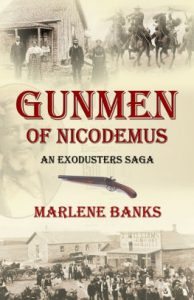1887 – Kansas
Resolving for different reasons to abandon lifestyles relying on their guns, four men with well-earned reputations settle quietly outside the African American town of Nicodemus, Kansas. Payment being cash and ownership of land, the men are commissioned to protect the town from an unscrupulous land baron’s attempted takeover. They face challenges from unwelcoming townsfolk, a devious adversary, and powerful corporate greed, along with their personal and spiritual struggles and budding romances. This novel has something for everyone; interesting characters, romance, strong spiritual insight, an attention holding multilayered plot, and western action.
Gideon McCoy, Caleb Cain, Joshua Boudreaux and David ‘Boone’ Tennyson are immediately attracted to the charming Nicodemus women: Sugar, a beautiful farm girl, Louise the talkative daughter of a general store owner, Liberty a sassy saloon owner and the newly arrived schoolmarm, Polly.
While Nicodemus residents enthusiastically anticipate the advent of the Pacific Union Railroad, a scheming Lucas Hitchcock, the cultural mentality of greed, shady government dealings, and ingrained racism work against a potentially beneficial arrangement. Yet the Godly presence in Lucas’ most despised enemy, Geoffrey Abington, foils his vicious bid for control. Nicodemus becomes pawn in a tug of war between the railroad company only concerned with expansion and profit, Lucas Hitchcock’s power play and the godly team of Geoffrey Abington and his friend Harlan Colby. Harlan, a loving family man and longtime railroad executive is fed up with his company’s trend of unethical business practices. He takes a bold stand for what he believes is God’s standard in business, society, and humanity as a whole. People are being harassed, run from their land and even killed. The four gunmen are hired to protect the town’s citizens but encounter obstacles both spiritual and natural they did not foresee. Sides are drawn culminating into a tragic showdown and only God can deliver victory to Nicodemus.




















